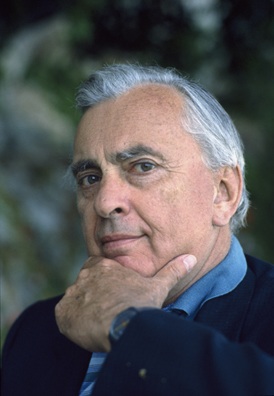
Originally published in the San Francisco Northside newspaper in July, 2008
The scene is Beverly Hills, Ca., autumn 2005: Gore Vidal is lecturing at a local bookstore to a hushed audience. He takes questions, and many of them revolve around the 2004 election.
At the time, the Bush Administration indictments and the Scooter Libby affair about CIA leaks were in the news. The media speculated about whether Karl Rove would be the next to be indicted. Oddly enough, this current event wasn’t discussed. Afterward, I approached Vidal and asked his opinion about the fate of Karl Rove.
“He’s headed for the dustbin, my dear. They’re all headed for the dustbin.”
“The dustbin of history?” I asked, referring to the Trotsky quote.
“Yes, precisely.” Gore flashed me his trademark sideways grin.
Now more than ever, Gore Vidal comforts the disturbed and disturbs the comfortable. The Selected Essays of Gore Vidal presents in a new anthology a collection of new and previously published essays by America’s premier man of letters.
The last remaining lion of postwar literature, Vidal is equally known for his commentaries on the contemporary political scene in the United States. His observations are served up with a clarity and razor wit that hearkens back to the old Republic that Vidal so longs for, and to the era of Enlightenment that valued tolerance and human dignity over intolerance and war profiteering.
Vidal can bring humor to the darkest of places. In an essay from 2002 entitled “Black Tuesday”, Vidal likens the U.S. bombing Afghanistan to rid the world of terrorists to “… destroying Palermo in order to eliminate the Mafia.”
This volume contains a consistent theme. Vidal does not let any of our elected leaders off the hook. Throughout the decades, Vidal has tirelessly protested wars that he describes as unjust and lacking a clear military objective or benefit to the American citizenry. Vidal laments the replacement of public policy with commerce and leadership with political agendas. He often describes the U.S. government as a one-party system with two right wings, Republican and Democrat, united in serving corporate interests.
His deliberately provocative delivery seems radical until Vidal reminds us again that he is an American traditionalist. Mark Twain also touted the notion that the government should act as an engine driving the needs of the people. In our era, Vidal causes us to wonder when the concept of true representation became antiquated.
In his recollections of his literary colleagues, Vidal the gadfly is tempered. Many of these essays recount tales of his friendships with the great literary figures of the twentieth century including Tennessee Williams, Italo Calvino and Paul Bowles. Other writers appear in cameo roles: we hear the southern drawl of Carson McCullers, and catch a glimpse of Andre Gide’s dark velvet beret.
Larger than life, Vidal is a character in his own stories. As a novelist, playwright, actor, essayist and political commentator, Gore Vidal’s career, which spans over sixty years, intersects with most of the history and culture that he writes about. He continues to be a ubiquitous presence and a singular voice of our times.